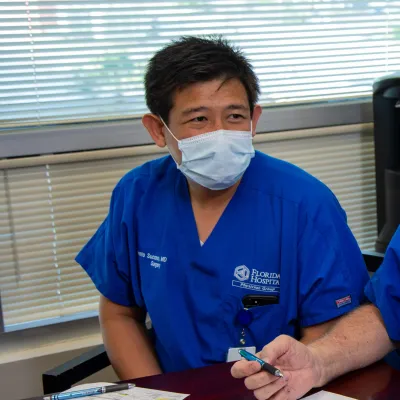
Minimally Invasive Treatment for Stomach Cancer
AdventHealth Digestive Institute is experienced in minimally invasive surgery to treat stomach, or gastric, cancer. A large majority of stomach cancers are adenocarcinomas, caused by chronic inflammation of the stomach, a condition called gastritis. This condition is commonly seen with people infected with Helicobacter pylori bacteria. Gastric cancer is also more common in people who eat a lot of smoked and salted meat and pickled foods. Smoking, obesity and previously having had gastric surgery are other factors that appear to contribute to stomach cancer.
Stomach Cancer Symptoms
At first stomach cancer rarely has symptoms, so it is not often detected early before it has spread to other parts of the body.
Gastric cancer symptoms are similar to those of many digestive disorders and can include:
- Poor appetite and resulting weight loss
- Stomach pain or discomfort above the belly button
- Feeling full soon after beginning eating
- Abdominal swelling
- Heartburn
- Nausea
- Vomiting, with or without blood
- Dark or bloody stools
- Anemia (low red blood cell count)
Diagnosis of Stomach Cancer
If it is suspected that you might have gastric cancer or another stomach condition, your gastroenterologist will likely order some tests such as:
- An upper endoscopy to get a better look.
- An endoscopic ultrasound if a gastric tumor is discovered. This will be used along with fine needle aspiration to take samples of cells.
- A pathologist will study the cell sample under a microscope to determine if the tumor is cancerous. If so, the biologic characteristics of the cancer cells will be studied, as they could help determine what the best treatment might be.
- Additional imaging studies to make sure all tumors have been detected.
- Minimally invasive, exploratory surgery may be required by some patients to make sure the cancer is confined to the stomach before beginning treatment.
Surgical Treatments for Stomach Cancer
For gastric cancers that have not spread beyond the stomach, a procedure called a gastrectomy is the standard treatment. This involves removing a portion or all of the stomach. The stomach will be reconstructed from other parts of the digestive tract so that it will be able to function in as normal a manner as possible.
Our surgeons are experts at performing less invasive surgery for this type of situation. Instead of a large incision through skin and muscle that is made in conventional surgeries, they make just one incision through the belly button. As you could expect, recovery from this less invasive procedure is much faster. This is particularly important for patients with cancer who may need radiation therapy after they recover from surgery.
After gastric surgery, you might feel fuller sooner while eating. This is because the part of your digestive tract used to create a stomach will be much smaller than your previous stomach. Also, your digestive tract will be shorter, so food will have a faster transit and you will likely need to use the bathroom more often. Removing all or part of your stomach may result in iron deficiency or anemia, so you may need oral or IV supplements. Finally, you may find the need to avoid meals high in carbohydrates or sugar, as these can cause abdominal pain, nausea, dizziness and flushing after your surgery.
Surgical Cancer Care
-
Esophageal Cancer
Typically esophageal cancer requires surgery in addition to radiation and chemotherapy. Learn more about the surgical treatments our specialists can provide.
-
Gastric/Stomach Cancer
We help diagnose and treat stomach cancer. We even have minimally invasive options. Learn more about how our gastroenterologists can help you.
-
Duodenal/Small Bowel Cancer
Our gastroenterologists diagnose and treat small bowel and duodenal cancer. We offer three minimally invasive treatment options.
-
Pancreatic Cancer
Our surgeons are among the region’s most experienced in pancreatic surgery. We can help treat your cancer with minimally invasive options. Learn more today.
-
Liver Cancer
Our AdventHealth Digestive Institute surgeons offer surgical and non-surgical liver cancer treatments, depending on your specific case. Schedule an appointment with one of our gastroenterologists.
-
Gallbladder Cancer
Removing the gallbladder with cancer is a very complex surgery that requires highly experienced surgeons like those at AdventHealth Digestive Institute.
-
Colon and Rectal Cancer
Our experienced gastroenterologists can diagnose and treat colon and rectal cancer. Learn more about treatment and surgery options.
-
Anal Cancer
Our colon and rectal surgeons can help diagnose and treat anal cancer. We offer anal cancer surgery when necessary.
-
Public Reporting of Outcomes
Our compassionate medical staff is committed to providing high-quality healthcare services in Hillsborough County.

Recover Faster With Minimally Invasive and Robotic Surgery
All the surgeons at the Digestive Health Institute (DHI) have a large depth of experience in offering minimally invasive surgery.
Meet The Expert

Sharona Ross, MD
General Surgery

Surgical Consultations For Digestive Cancer Without The Wait
Appointments Within Five Days for Patients with Cancer
At AdventHealth Digestive Institute, we know that after being diagnosed with cancer, patients want and often need to begin treatment quickly. So we make it a priority to offer appointments for cancer surgery consultations within five business days, and often earlier.
Patients who are newly diagnosed with cancer, or have just found out they have cancer again, qualify for this priority access. Our surgeons will make themselves available to see you right away, even for a second opinion. We want to help you start your treatment as soon as possible.
News and Info
-

-

-

-
 Blogs
BlogsDigestive Institute Tampa Surgeon Appointed to Advisory Board of Robotic Surgeons
Estimated read time: -
 Blogs
BlogsSafeguard Your Colon Health: Get The Facts about colorectal cancer screening tests
Estimated read time: -

